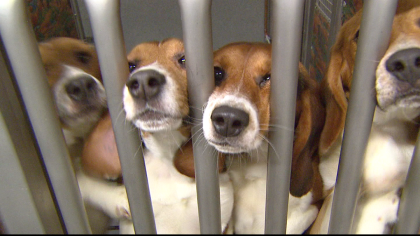The irony of scientific research on beagles
“ . . . The very same characteristics that make beagles wonderful companion animals and beloved members of the family make them vulnerable victims for lab experiments,” says Jeremy Beckham of the Beagle Freedom Project.
The morality of testing on animals has been a argument for more than a century, especially when a familiar, friendly dog is brought into the picture. It is also noted that most laboratories cannot recognize the difference between a lab rat and a lab beagle, so it is often that most animals in the lab setting are treated with little to no respect or caution during their time spent testing.
However, there is a bright side to this story. Due to recent traction that animal testing has caught over the last two decades or so, many labs involved in animal testing have been shut down, and thousands of animals have been given the loving homes they deserve.
There are many other organizations such as the European Coalition to End Animal Experiments, the Center for Alternatives to Animal Testing, and the Physicians Committee for Responsible Medicine besides the Beagle Freedom Project working to protect animals from the cold steel cages of a laboratory setting.
Today’s topic of discussion, however, is rescue group CUPA (Compassion Unlimited Plus Action), who took in 156 beagles discarded from a laboratory located in Bengaluru, India on May 16th of 2017. The dogs were bred specifically to test cosmetic products, pest killers, and pharmaceuticals. After asking the government permission to test, the staff was rejected and the animals were surrendered.
The dogs, aged seven to ten years old, have never seen the light of day, felt grass on their paws, socialized with other animals, been bathed or potty trained, or felt a kind touch prior to the massive rescue.
Previously identified by federal issued serial numbers tattooed to the inside of their ears, all 156 of the dogs have been given names and listed for adoption.
When considering to adopt a rescue animal, especially one from a laboratory or testing facility, patience is crucial. Each animal is an individual who needs extra love and attention in order to stay comfortable at home or life in general to make up for the suffering they have bared.

I am in the 12th grade. I took journalism as a way to improve my writing skills and keep up with the news. In the future I want to major in engineering...














Mrs. Saam • Feb 21, 2018 at 4:34 pm
So glad you wrote this article. This needs wide audience attention. I rescued a greyhound and to see what these animals endure is heartbreaking.
Team Beagle • Feb 9, 2018 at 3:30 pm
http://www.runfreealliance.com
http://www.beaglefreedomproject.org
http://www.unitetocare.com